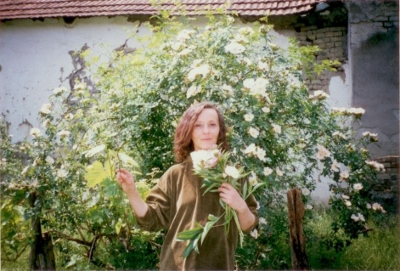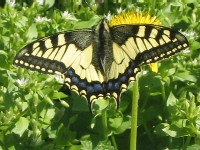|
 ANIMULA, VAGULA, BLANDULA
ANIMULA, VAGULA, BLANDULA
Ivana Milankov was born in 1952 in Belgrade, a propitious year as this was year when the great triumvirate of Serbian modernist poets, Ivan Lalić, Miodrag Pavlović and Vaško Popa began to make their mark. Although she lives in Belgrade Ivana has roots in the Vojvodina, the Serbian region of the Pannonianplain that stretches north to the Hungarian border and the foothills of the Carpathians which run in a great arc from Serbia through Romania, Ukraine,Southern Poland and Northern Slovakia tapering to foothills in the south-west of Slovakia close to Bratislava. She spends her summers at a house belonging t oher family in the part of Vojvodina known as Banat.
Ivana completed her education at Belgrade University in English language and literature and pursued her vocation as a poet supporting herself as a teacher of English in secondary schools and by translating. I met her as the translator prevailed on, as she was almost every year by the Serbian Writers’ Association, to translat ethe poems I would read at the International Meeting of Writers in Belgrade in 2002. Invariably she would be given less than a week to render a slew of the visiting Anglophone poets’ work into passable Serbian versions and usually without the opportunity to consult the poets over points of difficulty. Year sbefore Allen Ginsberg had met her in similar circumstances in Belgrade and with his famous sympathy for the put-upon had decided that there might be more to the waif-like young translator than the male, Yugoslav organizers of the meeting had let on. Ivana was invited to a workshop run by Ginsberg and AnnWaldman at the Naropa Institute near Boulder, Colorado. Later she spent some time in Poland, which is a source for some of the poems in this selection, such as Baltic Profile. In the 1980s Ivan awas active in performance art and street theatre which has imparted a continual sense of the poem coming into being as one reads her work and how it impinges on the reader’s or audiences consciousness and then withdraws leaving on eanxious to follow the performance and see where it might take the audience.
Fifty years ago twentieth century European poetry was introduced to British readers through the Penguin Modern Poet series sometimes picking up initiatives of other publishers such as Rapp and Whiting. Poetry in what was understood as Serbo-Croat was represented by the Ted Hughes and Anne Pennington versions of Vaško Popa which focused on a narrow part of his work, a world based on Balkan folk motifs, fragmented ,anthropomorphic and harking back to Neolithic cultures. This has always seemed to me to be a coincidence of an aspect of Popa’s poetry with a particular rstrand in Hughes’s poetry at that particular stage in his career, where the potential for violence is contained within forms alien to the British poetic tradition. This intuited pagan origin for Serbian poetry has been reinforced in recent years by publication of Charles Simic’s translations of the poetry of Aleksandr Ristović and of Radmila Lazic. Despite exemplary translations of Lalić by Francis Jones and less visible translations of Pavlović in Canada the twentieth century connection of Serbian language poetry with European modernism, evident in the work of these two poets, has been shoved to one side. Ivana Milankov’s poetry rehabilitates for the English reader the connections with a modernism informed by Serbia’s classical and religious culture. It has to be emphasized that from the early third century to the late fourth centurythe Roman Empire was sustained largely by a series of Balkan-born soldier emperors many of whom originated from the territory that now comprises modern Serbia. The emperor Constantine, who made the most important decision for the religious-political history of Europe by adopting Christianity was born in the southern Serbian city of Niš. Consequently, it is not surprising to encounter enormous cultural pride among Serbian intellectuals. There is a similar hauteur among Croatians. Ivana’s poetry draws part of its reference from the ancient presence of the Roman Empire and surrounding ancient civilisations of the Middle East particularly with regard to the strain of mysticism passed from civilisation to civilisation even into the philosophy ofChristianity. The animae of these civilisations inhabit her poems.
Bojana Stojanović Pantović in her illuminating essay Poetryof New Senses has aligned Ivana with post-modernist practice instancing the allusive nature of her poetry “the hermetic images and scenes in which are distilled mythical, historical, literary and empirical fragments, never refe rto their models directly.” This might make it puzzling to English readers accustomed to the crude representational and mimetic realism which still prevails in contemporary British poetry. For me Ivana’s poetry has something in common with that of the Uruguayan poet, Ida Vitale (born 1923). The opening lines of Vitale’s Moth, Poem might stand for how we might approach meaning in Ivana’s work: “In the air was /imprecise, tenuous, the poem. / Imprecise as well / the moth arrived.” Ivana is the most tentative of poets. The lyrical I is constantly being called into question as she is well aware of the uncertainty of images and how they might be generated by other uncertainties: “Yet this image only will endure on the skin / and then, behind another and behind one unknown: / a cathedral, its base made of fog and leaves.” Call me Atlantis.
Pantović perceptively focuses on the figure of the Emperor Hadrian who is the protagonist in a number of her poems. Hadrian is perhaps still known in every British primary school as the emperor who built the wall between Britannia andCaledonia, which still stands as a border between England and Scotland. However, in European culture he is perhaps the most complex individual who held political power in the classical world. He was an emperor who never fought a major war and wars may have been prevented by his ceaseless travelling through the length and breadth of a Roman empire at its greatest extent. He was also a highly cultivated, homosexual who was devastated by the death of his lover, Antinous, whom he unprecedentedly deified. The opening line of the quatrain Hadrian is said to have written shortly before hisdeath, whose opening line is the title of this essay indicates one aspect of his personality. “Animula, vagula, blandula” (little, agreeable, roving soul) could also indicate the impulse which moves Ivana’s poetry and is a fair evocation of her slight, physical presence, but vivid spiritual personality. On the surface in some of the poems the persona can dart about from place to place separated by great distances in space and time: “a Sumerian face / rain and apparitions at midnight / I am their quarrel. / All of this reverberates on Saturn”, I Have Forebodings. Ivana brings together epochs and geographies remote from one another as well as a bricolage of objects as in The Tenth, I Dare Not Say Who That Might Be: “a knife, a ring, a needle, / pebbles from Crete, binoculars, a pressed rose, / a letter from Ireland, a yellow scarf, a map of an eastern city” as though to indicate how the disparate experiences of travel, personal history and culture can jostle each other in consciousness as an individual seeks for meaning. Ivana adopts the persona of the Emperor Hadrianin Hadrian, To A Likeness Hidden as somebody attempting to travel beyond experience: “To Thrace I have come / for something quivering, inviting, / that has never existed in the senses and in reason before.” The quest is of course doomed, but there is never a sense in Ivana’s poetry that it is not worth undertaking.
Ivana’s poetry is also highly sensual. She is marvellous at evoking the sense of touch particularly when something in the environment around us changes such as a movement of the air so that our skin prickles with anticipation: Hoarfrost descends / quietly / without noise or hope. / The world is made of cotton. Noon in a Glass Bell. However, as she communicates a frisson she undercuts with a contradictory sensation. Glass is a motif that recurs in her poetry often set against softer less adamant materials such as silk and powder. Apart from a single instance, 36, The Richmond Bus, set ironically in the capital of the land of straight narrative verse, Ivana’s poetry is built through modes of perception and how we might try to unravel and fail to unravel what they mean. Like all true lyrical poetry the quandaries and contradictions are organised in a manner whose emotional resolution is akin to music. We are dazzled by an imagery whose structure and development confounds our expectations. Despite this it is a surprisingly transparent poetry where a world is created in each poem and which holds out attention through an underlying drama of reason and feeling.
|


